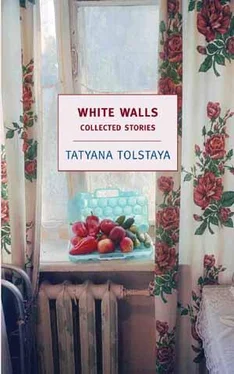Her mouth was not made for kissing. No. It was simply a dry, prim, pedagogical mouth, which with age acquired that particular array of surrounding wrinkles that unmistakably indicates honesty, goodness, and simplicity—all those tiresome, well-meant, inarguable truths that its owner hastens to share with you: The north is cold, the south is hot; May mornings are better than November fogs; sun, lilies of the valley, and golden curls are good; tornadoes, toads, and bald patches are bad. And roses—roses are the best thing on earth.
Zhenechka always stuck to her routine, of course. She exercised in the morning. In all seasons, she kept the window cracked open at night, and made a point of waking early—not because she liked gray, dank dawns, but because she could be useful in the mornings. The luxury of idleness was unknown to her, coquetry beyond her ken, playfulness alien, intrigue incomprehensible, that’s the reason Hymen ran from her, not because he was the least bit scared off by her hearing aid or her orthopedic shoe. No, those trifles appeared later—after the war, after the bomb that exploded close to her, when Zhenechka was already over fifty. That wasn’t the reason, of course. After all, even legless people can get married and have a family; it’s the soul that counts. And her soul was—well, they don’t come any simpler.
If our souls are usually constructed like a kind of dark labyrinth—so that any feeling running in at one end comes out the other all rumpled and disheveled, squinting in the bright light and most likely wanting to run back inside—then Zhenechka’s soul was built rather like a smooth pipe, with none of those back streets, dead ends, secret places, or, God forbid, trick mirrors.
And the face matched the soul: simple blue eyes, a simple Russian nose. It would even have been quite a nice-looking face if it hadn’t taken forever to get from the nose to the upper lip. Short, fluffy hair, a style called “smoke.” Braids when she was young, of course.
She wore simple muslin dresses, undergarments that were clean and cheerless; in winter she put on a shabby quilted cotton coat that she called her “fur,” and covered her head with a tall boyar’s hat; summer or winter she never removed her amber beads, worn not for beauty’s sake but for her health, because she believed some sort of electricity emanated from them.
She taught Russian her whole life, and—if you think about it—how could it have been otherwise?
Giving presents was her favorite activity. Winters in our Leningrad apartment, at the core of my childhood, there would be a ring at the door, and—smiling, squinting, treading heavily on her orthopedic shoe, leaning on her staff—little boyar Zhenechka would enter in her cloth “fur,” a real fur hat over her puffed hair, a fresh ruddiness on her middle-aged cheeks, in her hands a pastry box and other tiny, mysterious bundles.
We would all run out into the foyer; smiling silently, Zhenechka would hand over her things—the staff to the right, the tall hat to the left—and unbutton her heavy coat. Freed from its padding, the hearing aid on her chest filled with our cries and greetings, the smack of our kisses, shouts about how young she’d gotten and how well she looked. Having combed the fluffy smoke at the mirror and straightened the heavy amber beads, Zhenechka got down to passing out her gifts: for the grownups, useful, serious books that got leafed through, set aside, and never picked up again; for us, tiny flasks of perfume, little notebooks, or surprising trifles miraculously preserved from prerevolutionary times—statuettes, embroidered brooches, ancient cups with broken handles—treasures to take any little girl’s breath away. Amazing how all these easily lost, perishable little things filtered down through the years. Time’s meat grinder readily destroys big, solid, cumbersome objects—cabinets, pianos, people—while all manner of fragile odds and ends that appeared on God’s earth to gibes and raised eyebrows—all those little porcelain dogs, miniature cups, minuscule vases, rings, drawings, snapshots, boxes, notes, knickknacks, thinga-majigs, and whatchamacallits—pass through unscathed. Zhenechka’s tiny apartment somewhere on the edge of the city near the sea was crammed with all this marvelous junk, while her sisters—the three here and the fourth, who’d gone to live in Helsingfors, beyond that sea, beyond its sad, gray waters—had vanished like smoke. We were all she had left in the world.
Having handed everything out and received the happy squeals and kisses due her, Zhenechka picked up her pastries and marched off to the parlor to drink coffee.
The pastries, of course, were from Nord—the best. On her bad legs, Zhenechka had stood in a long line for them in that magical basement, that gathering place for all believers in sugary terrestrial bliss, where impatient ladies intent on instant happiness elbow their way over to the side gripping a pastry in tremulous fingers and—pressed by the crowd to the mirrored column, to their own agitated reflections—snort like eager fairy-tale stallions, their nostrils exhaling a double, swirling puff of sweet powder that slowly settles on their silver-fox collars.
Zhenechka would open the box wherein reposed the grand, monarchical pastries Napoleon and Alexander; beside them, like Dmitry the Pretender, the despised shortbread ring, that constant of railroad snack bars, had wormed its way in. No one would eat it, but to Zhenechka it, too, seemed wonderful—the ruddy embodiment of a sated, crumbly dream dreamt during the not-yet-forgotten hungry nights of the wartime blockade.
Until the pastries are gone, being with Zhenechka holds my interest, and then, alas, it’s boring. She talks in detail about her health, the contents of a book she read, the flowers that grow so luxuriantly in summer at a friend’s house near the Peri station (from the station walk straight ahead, turn left, then one more turn, and it’s the second house) but don’t grow at all in winter because of the fact that in the winter the ground is covered with snow, which falls from the sky, and thus unfortunately nothing can grow, but as soon as spring comes and the days get longer and the nights shorter and the sun starts warming things and leaves appear on the trees, then, of course, the flowers will bloom again….
I slip quietly out of the room and off to the kitchen; that’s where real life is! Marfa, the housekeeper, is drinking tea with the lady who operates the elevator. Marfa is a tall, bald, cunning old peasant woman who was washed up at our door by the war; she knows absolutely everything better than everybody.
“…So he says keep an eye on my suitcase, lady, will you? I’ll be back, he says, in the wink of an eye. So she takes it from him. Right away he’s up and gone. Well, he’s gone for an hour, and he’s gone for two, and now she has to go home. She’s bone-tired of waiting. She figures she’ll hand it over to the police, but she thinks, well, I’ll just take a look-see. So she peeks inside.” Marfa raises her eyebrows up high, pokes the sugar lumps with the tongs.
“Well?” says the elevator lady, alarmed.
“Well to you too. A fine how-de-do! She thought maybe there’s valuables in there, or something. Opens it up—Heavenly Mother of God!… A head, with mustaches!”
“Chopped off?!”
“Right to here. Just a head, deary, with mustaches. Some guy, not too old. And the head tells her: Shut the suitcase, he says, and don’t stick your nose where it don’t belong!”
“Oh my! The head says that?”
“Yes. Well, she’s off and running for all she’s worth. And the head yells after her: ‘Shut the suitcase, you stupid fool, or you’ll be in big trouble!’ And he starts cussin’ her something fierce.”
Читать дальше












